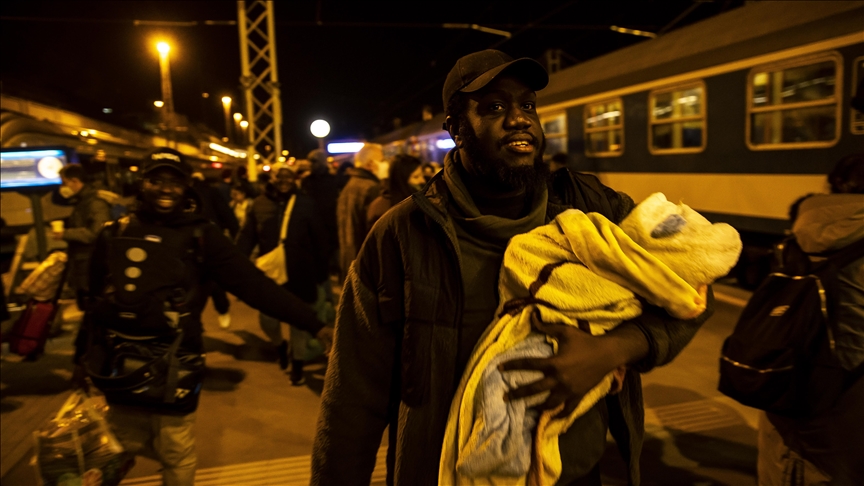
More than 2 million refugees have fled Ukraine since Russia’s military occupation. Those still in the country are facing increased airstrikes—including bombings of places like maternity hospitals. Many are still undergoing treacherous journeys to escape the violence.
This is devastating and heartbreaking.
I am in solidarity with Ukrainian refugees, and we’re seeing global solidarity with these innocent people. Poland has accepted the largest number of refugees, welcoming many with open arms.
However, thousands of Black and brown refugees fleeing Ukraine have been turned away at train and bus stations across the country, as well as at the Polish border. Many are still trapped in a war zone because of their skin color.
African students have described arriving at the border on buses only to hear from officials that “all Blacks” needed to get off the buses. They, along with others arriving on foot, have been separated into two lines: one for white Ukrainians, and one for Black and brown people, many of whom are visitors or students.
After thousands waited for days while watching white people get through quickly, some people began protesting, at which point police turned their guns on the group and said that they would shoot.
One Black man described pleading with the officers, telling them: “We are students, we just want to go home.” He did end up making it to Poland, where in an interview he teared up while saying: “I was expecting people at wartime to be more compassionate. I wasn’t expecting them to do such things.”
Unfortunately, this disparate treatment of people of color is not new. As a neighbor in a predominantly Black city, and as a Palestinian American, I am deeply familiar with systemic racism and oppression, including segregation.
As we know, the United States treats refugees very differently based on their race. In the past year, the Biden administration has deported more than 20,000 Black Haitian refugees. Our immigration system has also recently subjected Black Cameroonian refugees to torture and deportation back to harm.
Now, European countries—which have demonized and closed their borders to refugees from the Middle East and Africa—are now mobilizing to fast-track asylum applications. The EU announced that it will offer temporary residency for Ukrainian citizens for up to three years.
Of course, this support for Ukrainian refugees is wonderful and much-needed.
We’re seeing that this humanitarian response is possible—and it should be replicated for everyone fleeing war. All refugees should be welcomed into safe places, rather than vilified.
Blatantly racist media coverage of the war and refugees has clearly shown how Black and brown people are deemed less worthy of support and even of living.
For example:
- A CBS News reporter described white Ukrainian refugees as more “civilized” than Arab refugees.
- The BBC featured someone who said: “It’s very emotional for me because I see European people with blue eyes and blond hair … being killed.”
- A Telegraph reporter in the UK wrote: “They seem so like us. That is what makes it so shocking.”
- An NBC News correspondent said: “These are not refugees from Syria, these are refugees from Ukraine… They’re Christian, they’re white, they’re very similar.”
- Even a commentator on Al Jazeera said: “These are prosperous, middle-class people. These are not, obviously, refugees trying to get away from areas in the Middle East that are still in a big state of war. These are not people trying to get away from areas in north Africa. They look like any European family that you would live next door to.”
- The Bulgarian Prime Minister said: “These are not the refugees we are used to … these people are European. These people are intelligent, they are educated people.”
These are all examples of dehumanizing racism, implying that Arabs, Africans, and non-Christians are inferior—and that their lives matter less than those of white people.
Of course these bigoted assumptions about worthiness, as well as education and intelligence, are wrong. But these ideas have been underpinning white supremacy, white colonialism, and white imperialism for centuries.
We’re hearing unmistakeable beliefs that white people are more human and more deserving of life. The assumption is also that the people watching and reading—the people defined as “us” and “you”—are white.
I hope we can learn from this moment that anyone fleeing war deserves support—no matter their ethnicity, race, or religion. And our global struggles for justice and against oppression are intertwined.
We all have a right to live safely, and to be recognized and treated as human beings. THAT is what I am fighting for. That is what WE are fighting for, together.
We all deserve human rights. We are all human beings, interconnected in so many ways. We all deserve to live free from persecution and to safely be our authentic selves.
This moment is showing us how far we still need to go for that to be a reality. So let’s continue our work of building global solidarity for and among all people.
With love,
Rashida